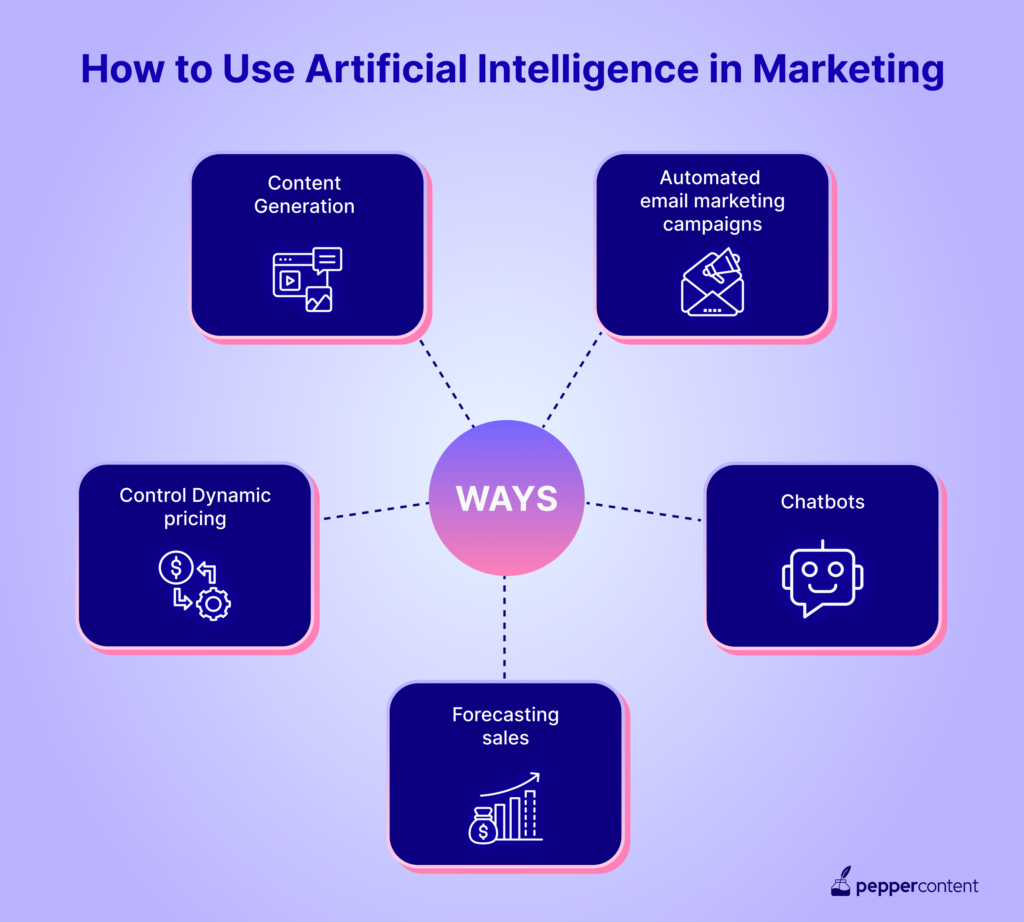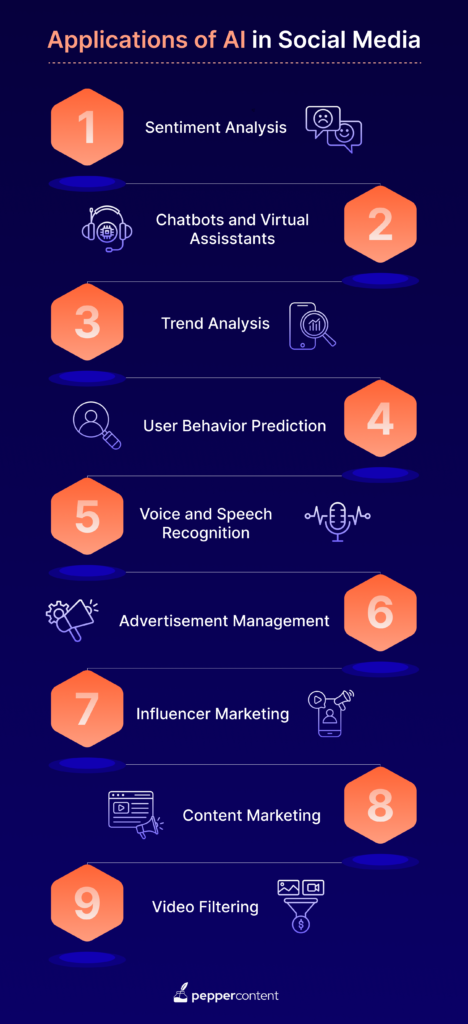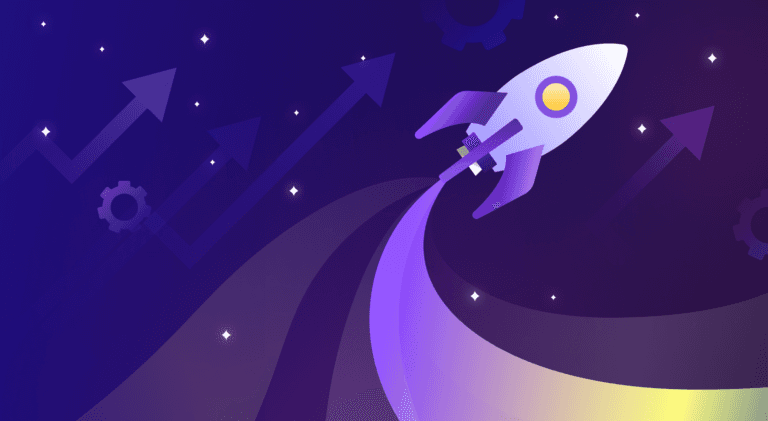How to Use AI in Marketing to Automate Your Social Media Strategy

Today, when we look at how to use AI marketing, we’re talking about its use as a necessity that is no longer an optional add-on. The emergence of automation and artificial intelligence has reshaped how businesses engage with their audience, especially in content marketing. It offers a hands-on way for marketers to focus less on repetitive tasks and more on strategy, making it indispensable for small teams and solo entrepreneurs. While the buzz surrounding AI may sometimes feel overwhelming, what it does for marketing is simple and clear-cut—an efficient ally for any business looking to grow. Let’s dive into how to use AI in marketing and look at real-world examples of AI in action.
The Appeal of AI in Marketing

The beauty of using AI in marketing is its ability to quickly process vast amounts of data. What used to take hours or days for a marketing team to analyze can now be done in minutes. AI is invaluable for breaking down consumer preferences, and allowing brands to understand their target market. This knowledge enables marketers to take action, tweaking campaigns as needed.
Instead of getting bogged down by tasks like analyzing customer data, scheduling posts, or drafting content, marketers can focus on being more creative and strategic. The real question is not just about how to use AI in marketing but also about understanding its range of possibilities. The answer isn’t about significant changes; it’s about making your day-to-day work easier and more effective.
Putting AI to Work in Marketing
Here are some practical ways to use AI in marketing today:
Data analysis
The sheer volume of data available to businesses can be staggering. AI offers a way to turn that data into meaningful insights. Whether you’re analyzing past campaigns, looking at audience behavior, or forecasting future trends, how to use AI in marketing becomes clear—AI crunches numbers in a way humans simply can’t.
For example, tools like Google Analytics already use AI to identify patterns and trends in your website traffic. They take these patterns and suggest actionable next steps. This isn’t just useful; it changes how to use AI in marketing to improve content strategy.
Personalization
One of the most powerful ways to use AI in marketing is personalization. Customers expect a tailored experience, and AI makes it possible to offer just that. From recommending products based on previous purchases to curating content that matches user preferences, how to use AI in marketing turns customer engagement into a deeply personal experience.
Brands like Amazon and Netflix have become masters of this. AI in marketing examples like these shows how companies can connect with customers in an impactful way, ensuring that recommendations and content are tailored to individual tastes.
Predictive analytics
Marketers can anticipate future customer behavior through AI’s predictive capabilities. This includes analyzing historical data to foresee buying patterns or predicting how a new product launch might fare. Businesses can adjust their strategies accordingly by understanding potential customer actions before they happen. This is another great illustration of how to use AI in marketing.
Marketers can make informed and confident decisions with AI tools that provide predictive analytics. It’s not magic; it’s data at work, showing how to use AI in marketing to anticipate needs.
AI in Marketing Examples From Real Brands
When it comes to AI in marketing examples, a few companies stand out:
- Netflix: Their recommendation engine is a standout. By tracking user habits, Netflix provides a curated experience that keeps users engaged, increasing time spent on the platform.
- Amazon: Their product recommendation system is built on AI algorithms that study browsing history, purchase patterns, and even the time of year. This keeps the suggestions relevant and boosts overall sales.
- Sephora: The beauty retailer’s virtual assistant offers product recommendations and advice based on user preferences and feedback.
These AI marketing examples show that the possibilities are endless. Each of these companies uses AI to enhance customer experience. Learning to use AI in marketing from these brands shows how to cater to specific customer pain points.
AI Tools That Help in Social Media Marketing
There’s no shortage of AI tools to assist marketers with daily tasks. While the range of AI tools is vast, here are some popular options when it comes to social media marketing:
- Buffer: Buffer helps you stay on top of your social media game. It uses AI to analyze the best times to post, ensuring that your social media content hits when your audience is most active. The platform also provides feedback on your engagement stats so you can continuously improve your use of AI in marketing strategies.
- Hootsuite: Hootsuite provides social listening and performance analysis using AI. Its features help you track trending topics and optimize your social media strategy without missing a beat. It’s another great example of how to use AI in marketing social media content.
- Sprout Social: This tool combines social listening, sentiment analysis, and AI-driven content recommendations. It offers detailed insights into your audience’s behavior, giving you the edge regarding social media content curation and posting schedules.
- Later: Later’s AI focuses on visual content scheduling, making it ideal for Instagram-heavy marketing campaigns. It lets you preview posts, plan the layout, and even tap into user-generated content, all while analyzing your audience engagement.
- Pepper Content’s Organic Marketing Stack: This comprehensive solution integrates AI across various aspects of content marketing. It enables seamless content creation, optimization, and distribution, ensuring your strategy is both effective and data-driven. Explore using AI in marketing with Pepper Content’s Organic Marketing Stack to transform your content efforts and achieve enduring results.
Each tool provides a specific set of features tailored to marketers who want to use AI in marketing effectively. The goal here is to automate, streamline, and simplify. Using these tools, marketers can create high-quality content quickly. More importantly, they can dedicate more time to creative efforts while allowing AI to handle repetitive work. It’s a real win when considering how to use AI in marketing.

Social Media on Autopilot
With AI, one of the most significant benefits is automation, especially regarding social media. Scheduling posts, responding to comments, and even tracking engagement can be automated through AI.
Scheduling
Platforms like Buffer and Hootsuite allow you to pre-schedule posts. AI takes it a step further by suggesting optimal posting times so your content reaches the maximum audience. This is another efficient way of understanding how to use AI in marketing for social platforms.
Engagement
AI chatbots can take over basic interactions, ensuring your social media profiles stay active, even when you’re offline. These chatbots can respond to customer inquiries, offer recommendations, and more, helping businesses realize how to use AI in marketing for customer service.
Tracking Performance
Using tools like Sprout Social or CoSchedule, marketers can track the performance of their posts in real time. AI tracks engagement, comments, and even the sentiment behind the interactions, offering insights that allow marketers to tweak their strategies as needed. It’s an excellent example of how to use AI in marketing for real-time data.
Challenges with AI in Marketing
While AI offers numerous benefits, there are some challenges to be aware of:
Learning Curve: Implementing AI tools can take time. It’s not a matter of simply adding AI to your tech stack; you need to understand how to use AI in marketing effectively.
Cost: Many AI tools can be expensive, making them less accessible for small businesses.
Quality Control: While AI can create content, it is essential to review and edit it. The technology isn’t perfect, and human oversight ensures that the tone and voice align with the brand’s message.
Despite these hurdles, AI tools for marketers are growing in popularity for good reason. They save time, offer insights, and can change how AI is used in marketing.
The future of marketing is already here, and AI plays a big part in making it smarter and more efficient. Whether you’re a one-person team or a large corporation, there’s no doubt AI is an essential asset in the marketing toolkit. AI tools for content marketing allow you to automate mundane tasks, create personalized content, and refine your strategy through data-driven insights.
Did you know that Pepper Content’s Organic Marketing Stack offers a powerful way to integrate AI into your content strategy? Experience firsthand how AI can shape your marketing efforts and drive long-term results.
Latest Blogs
Explore how Google’s 2025 AI search updates triggered ranking chaos. Learn actionable strategies to adapt your SEO for AI Overviews, zero-click searches, and SERP volatility. Stay ahead now.
Learn how to rank on AI search engines like ChatGPT, Perplexity, and Gemini by optimizing your content for authority, structure, and relevance. Stay ahead in AI-driven search with this strategic guide.
Explore the best healthcare SEO services for your medical practice. Improve online visibility and effectively reach more patients in need of your services.
Get your hands on the latest news!
Similar Posts
Artificial Intelligence
3 mins read
How to Rank on ChatGPT, Perplexity, and Gemini: A Strategic Guide for Marketers

Artificial Intelligence
5 mins read
How Free AI Tools for Content Creation Can Boost Your Content Strategy

Artificial Intelligence
5 mins read